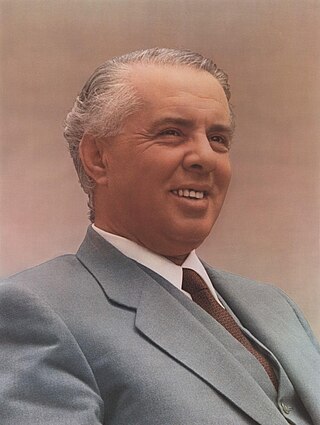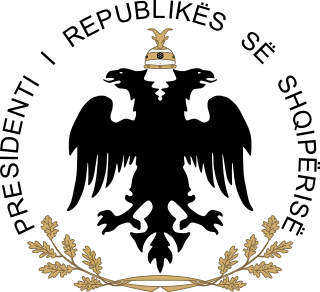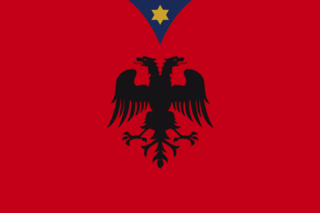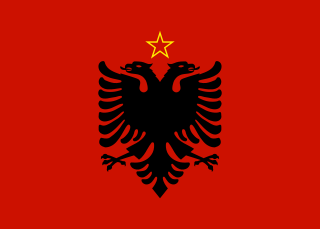
Albania, officially the Republic of Albania, is a country in Southeast Europe. It is in the Balkans, on the Adriatic and Ionian Seas within the Mediterranean Sea, and shares land borders with Montenegro to the northwest, Kosovo to the northeast, North Macedonia to the east and Greece to the south. With an area of 28,748 km2 (11,100 sq mi), it has a varied range of climatic, geological, hydrological and morphological conditions. Albania's landscapes range from rugged snow-capped mountains in the Albanian Alps and the Korab, Skanderbeg, Pindus and Ceraunian Mountains, to fertile lowland plains extending from the Adriatic and Ionian seacoasts. Tirana is the capital and largest city in the country, followed by Durrës, Vlorë, and Shkodër.

The Balkans, corresponding partially with the Balkan Peninsula, is a geographical area in southeastern Europe with various geographical and historical definitions. The region takes its name from the Balkan Mountains that stretch throughout the whole of Bulgaria. The Balkan Peninsula is bordered by the Adriatic Sea in the northwest, the Ionian Sea in the southwest, the Aegean Sea in the south, the Turkish straits in the east, and the Black Sea in the northeast. The northern border of the peninsula is variously defined. The highest point of the Balkans is Musala, 2,925 metres (9,596 ft), in the Rila mountain range, Bulgaria.

Enver Hoxha was an Albanian communist politician who was the ruler of Albania from 1944 until his death in 1985. He was the First Secretary of the Party of Labour of Albania from 1941 until his death, a member of its Politburo, chairman of the Democratic Front of Albania, and commander-in-chief of the Albanian People's Army. He was the twenty-second prime minister of Albania from 1944 to 1954 and at various times was both foreign minister and defence minister of the country.
The Enchele's polity was the earliest to emerge and centered in Albania. Also the earliest known Illyrian king, Bardylis, emerged in what is now Albania around 400 BC, aiming to make Illyria a regional power interfering with Macedon. He united many southern Illyrian tribes under his realm and defeated the Macedonians and Molossians several times, expanding his dominion over Upper Macedonia and Lynkestis. Before the Rise of Macedon Illyrians were the dominant power in the region. The kingdom of the Taulantii under Glaukias' rule was based in central Albania and dominated southern Illyrian affairs in the late 4th century BC, exerting great influence on the Epirote state through the close ties with the Molossian king Pyrrhus. Under the Ardiaei the greatest known Illyrian kingdom emerged in the 3rd century BC encompassing also northern Albania in its core territory. It became a formidable power both on land and sea by assembling a great army and fleet, and directly ruling over a large area made up of different Illyrian tribes and cities that stretched from the Neretva River in the north to the borders of Epirus in the south, while its influence extended throughout Epirus and down into Acarnania. The dominant power of the Illyrian kingdom in the region ceased after the Illyrian defeat in the Illyro-Roman Wars. The last known "King of the Illyrians" was Gentius, of the Labeatae tribe.

The Kosovo War was an armed conflict in Kosovo that lasted from 28 February 1998 until 11 June 1999. It was fought between the forces of the Federal Republic of Yugoslavia, which controlled Kosovo before the war, and the Kosovo Albanian separatist militia known as the Kosovo Liberation Army (KLA). The conflict ended when the North Atlantic Treaty Organization (NATO) intervened by beginning air strikes in March 1999 which resulted in Yugoslav forces withdrawing from Kosovo.

Kosovo, officially the Republic of Kosovo, is a country in Southeast Europe with partial diplomatic recognition. Kosovo lies landlocked in the centre of the Balkans, bordered by Serbia to the north and east, North Macedonia to the southeast, Albania to the southwest, and Montenegro to the west. Most of central Kosovo sits on the plains of Metohija and the Kosovo field. The Accursed Mountains and Šar Mountains rise in the southwest and southeast, respectively. Kosovo's capital and largest city is Pristina.
Albania is a unitary parliamentary constitutional republic, in which the president of Albania is the head of state and the prime minister of Albania is the head of government in a multi-party system. The executive power is exercised by the Government and the prime minister with its Cabinet. Legislative power is vested in the Parliament of Albania. The judiciary is independent of the executive and the legislature. The political system of Albania is laid out in the 1998 constitution. The Parliament adopted the current constitution on 28 November 1998. Historically Albania has had many constitutions. Initially constituted as a monarchy in 1913, Albania became briefly a republic in 1925, and then a authoritarian monarchy in 1928. In 1939 Albania was invaded by Fascist Italian forces, imposing a puppet state, and later occupied by Nazi German forces. Following the partisan liberation from the Nazis in 1944 a provisional government was formed, which by 1946 had transformed into a communist one-party state. In March 1991 democracy was restored with multi-party elections.

Sali Ram Berisha is an Albanian cardiologist and conservative politician who served as the president of Albania from 1992 to 1997 and 32nd prime minister from 2005 to 2013. Berisha serves as Chairman of the Democratic Party of Albania since 2022 and has held the position previously from 1990 to 2013. He also serves as the incumbent Leader of Opposition in the Albanian parliament.

The president of Albania, officially styled the President of the Republic of Albania, is the head of state, commander-in-chief of the military and the representative of the unity of the Albanian people.

Edi Rama is an Albanian politician, painter, writer, former university lecturer, publicist and former basketball player, who has been serving as the 33rd and incumbent Prime Minister of Albania since 2013 and chairman of the Socialist Party of Albania since 2005. He was appointed Minister of Culture, Youth and Sports in 1998, an office he held until 2000. First elected mayor of Tirana in 2000, he was reelected in 2003 and 2007.

The Socialist Party of Albania is a social-democratic political party in Albania. It has been described as centre-left. It was founded on 13 June 1991. The PS is an associate of the Party of European Socialists and a member of the Socialist International, and holds pro-European views.

The Democratic Party of Albania is a conservative political party in Albania. It has been the largest opposition party in the country since 2013.

Southeast Europe or Southeastern Europe (SEE) is a geographical sub-region of Europe, consisting primarily of the region of the Balkans, as well as adjacent regions and archipelagos. There are overlapping and conflicting definitions of the region, due to political, economic, historical, cultural, and geographical considerations.

The Albania national football team represents Albania in men's international football. It is governed by the Albanian Football Federation (FSHF), the governing body for football in Albania. It is a member of UEFA in Europe and FIFA in global competitions. The team's colours reference two national symbols: the double-headed eagle and the country's tricolor. Their supporters are colloquially referred to as the Tifozët Kuq e Zi.

Albanians in North Macedonia are ethnic Albanians who constitute the second largest ethnic group in North Macedonia, forming 446,245 individuals or 24.3% of the resident population. Of the 2,097,319 total population in the 2021 census, 619,187 or 29.52% are Albanians.

The Albanian Football Federation is the governing body of football in Albania. The federation is based in Tirana, Albania. It organises the national football leagues of the Albanian Superliga, the First Division, the Second Division, the Third Division, the Albanian Cup and Supercup. Albania women's national football team, Albanian women's football championship, and the Albanian Women's Cup are also overseen by the FSHF. The federation also coordinates the activities of the Albania national football team and the Albania national youth football teams such as Under-21, Under-20, Under-19, Under-18, Under-17, Under-16 and Under-15.

The Parliament of Albania or Kuvendi is the unicameral representative body of the citizens of the Republic of Albania; it is Albania's legislature. The Parliament is composed of no less than 140 members elected to a four-year term on the basis of direct, universal, periodic and equal suffrage by secret ballot. The Parliament is presided over by the Speaker, who is assisted by at least one deputy speaker. The electoral system is based on party-list proportional representation. There are 12 multi-seat constituencies, corresponding to the country's counties.
The Rudaj Organization was an Albanian mafia gang in the New York City metro area, named for the man accused of being its kingpin, Alex Rudaj of Yorktown, New York. The Rudaj Organization, called "The Corporation" by its members, was started in 1993 in Westchester and spread to the Bronx and Queens. Prosecutors say the Albanian gang was headed by Alex Rudaj and an Italian-American man named Nardino Colotti who both had ties to the late Gambino soldier Phil "Skinny" Loscalzo.
Albanian mafia or Albanian organized crime are the general terms used for criminal organizations based in Albania or composed of ethnic Albanians. Albanian organized crime is active in Europe, North America, South America, and various other parts of the world including the Middle East and Asia. The Albanian mafia participates in a diverse range of criminal enterprises including trafficking in drugs, arms, and humans. Due to their close ties with the 'Ndrangheta of Calabria, they control a large part of the billion dollar wholesale cocaine market in Europe and appear to be the primary distributors of cocaine in various European drug hubs including London. Albanian organized crime is characterized by diversified criminal enterprises which, in their complexity, demonstrate a very high criminal capacity. In Albania, there are over 15 mafia families that control organized crime.

The People's Socialist Republic of Albania, officially the People's Republic of Albania from 1946 until 1976, and from 1991 to 1992 as the Republic of Albania, was the communist state in Albania from 1946 to 1991. It succeeded the Democratic Government of Albania (1944–1946).















